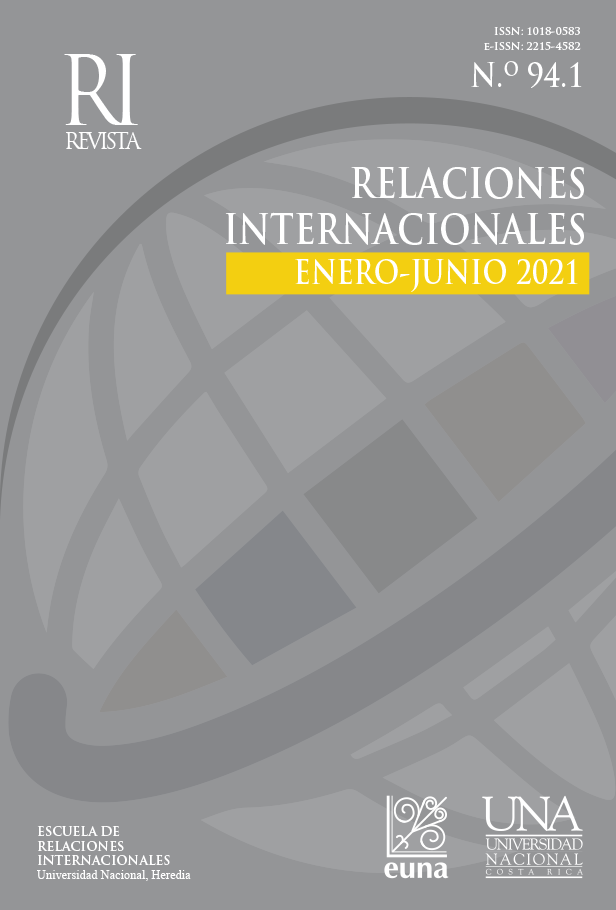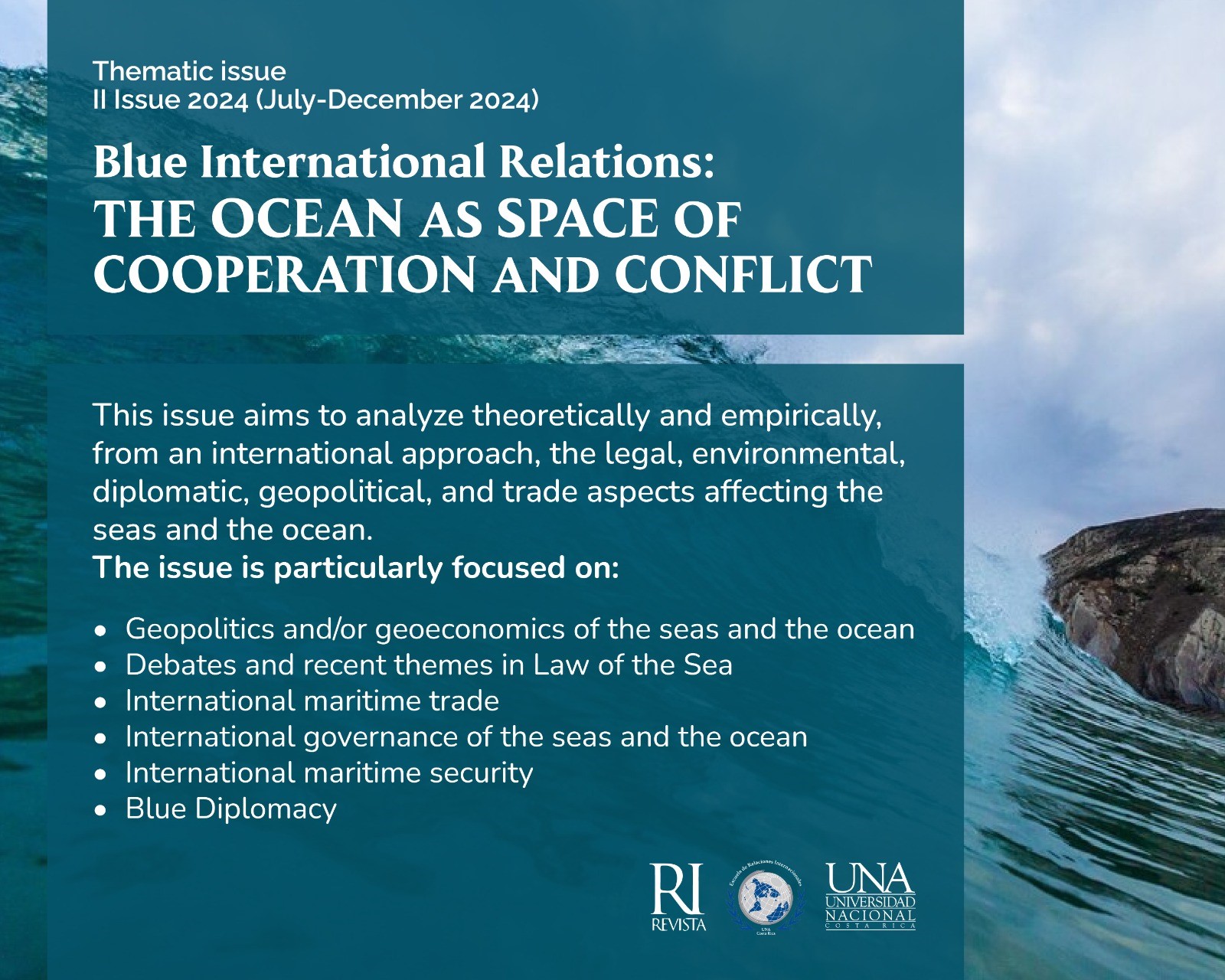The repercussions of Cuba’s economic opening with the United States within the international relations context
DOI:
https://doi.org/10.15359/ri.94-1.2Keywords:
Economic opening, Cuba, diplomacy, United States, international cooperation, inter-state relationsAbstract
This article is a bibliographic review aiming to show evidence of the repercussions of Cuba’s economic opening with the United States
from the International Relations perspective. A qualitative approach was applied in which the analytical method was used through a documentary-bibliographic cross-sectional review. The research identifies a rupture in diplomatic and trade relations between Cuba and the United States affecting the dynamics of inter-American international relations. It concludes that despite the agreement in 2014 between Washington and Havana, the Trump’s government kept several acts of hostility that negatively affect this agreement; therefore, cooperation opportunities should be sought to improve bilateral relations.
References
Acuña, P. (1993). Vinculación universidad-sector productivo. Revista de la Educación Superior, 22 (87), 1-15. Agramón, J. y Lechuga, J. (2019). Las disposiciones de transferencia de tecnología hacia los investigadores en las principales instituciones de educación superior públicas de producción científica en México. Innovaciones de Negocios, 16(32), 304-331.
Allison, G. (2017). Destined For War. Can America and China Escape Thucydes´ s Trap?, Estados Unidos: Ediciones HMH.
Alzugaray, C. (2017). La política exterior cubana de Cuba en la era Trump. Pensamiento Propio, 45, 205 -220.
Alzugaray, C. (2012). Las (inexistentes) relaciones Cuba-Estados Unidos en tiempos de cambio. Nueva Sociedad, 242, 139 – 148.
Badella, A. (2015). Obama and US Democracy Promotion in Cuba: New Strategies,
Old Goals? Caribbean Journal of International Relations & Diplomacy, 3 (2), 7-35.
Bye, V. (2013). The Politics of Cuban Transformation – what Space for Authoritarian Withdrawal? Norwegian Institute of International Affairs. https://www.nupi.no/en/Publications/CRIStin-Pub/The-Politics-of-Cuban Transformation-what-Space-for-Authoritarian-Withdrawal
Camargo, J., Miranda, G. y Karlsson, H. (2016). Un hangar para misiles nucleares reutilizado como casa de vivienda, almacén y comedor. Cuba Arqueológica, 9 (1), 7-16.
Canales, A.; Fuentes, J. y De León Escribano, C. (2019). Desarrollo y migración: desafíos y oportunidades en los países del norte de Centroamérica (Comisión Económica para América Latina y el Caribe - CEPAL). https://repositorio.cepal.org/bitstream/handle/11362/44649/1/S1000454_es.pdf
Cazallo, A.; Meñaca, I.; Lechuga, J. y García, J. (2019). La Alianza del Pacífico y los Brics: dos modelos de competitividad país. Revista Lasallista de Investigación, 16 (2), 122-141. http://dx.doi.org/10.22507/rli.v16n2a11
Clot, J. y Martínez, G. (2018). La «odisea» de los migrantes cubanos en América: modalidades, rutas y etapas migratorias. Revista pueblos y fronteras digital, 13, 1-30. https://dx.doi.org/10.22201/cimsur.18704115e.2018.v13.345
Congress of the United States of America. (1996). Cuban Liberty and Democratic Solidarity (Libertad) Act of 1996. One Hundred Fourth Congress of the United States of America. https://web.archive.org/web/20070926035730/ http://www.treasury.gov/offices/enforcement/ofac/legal/statutes/libertad.pdf
Domínguez, J. I. (2017, 19 de junio). Trump quiere negociar con La Habana. ¿Le saldrá el tiro por la culata? The New York Times. https://www.nytimes.com/ es/2017/06/19/espanol/opinion/trump-quiere-negociar-con-la-habana-le-saldra-el-tiro-por-la-culata.html
Embajada de los Estados Unidos. (2019). Viajes a Cuba. https://cu.usembassy.gov/ es/u-s-citizen-services-es/local-resources-of-u-s-citizens-es/viajes-a-cuba/
Gómez, J. (2018). Cuba: elecciones y luego ¿qué?, CNN. https://cnnespanol.cnn. com/2018/03/28/cuba-elecciones-y-luego-que/
Hernández, R., Fernández, C., y Baptista, P. (2014). Metodología de la investigación, México: Mc Graw Hill.
Ibarra, D. y Máttar, J. (1998). La economía de Cuba. Revista CEPAL, 29-37. https:// www.cepal.org/es/publicaciones/12153-la-economia-cuba
Lechuga-Cardozo, J., y Leyva-Cordero, O. (2019). Escenarios 2020 del Orden Mundial. Análisis desde la Prospectiva Estratégica. ÁNFORA, 27(48), 137- 161. https://doi.org/10.30854/anf.v27.n48.2020.672
López-Levy, A. (2019). Cuba y el gobierno de Trump: retorno al conflicto e implicaciones para la relación triangular con Europa. Análisis Carolina, 8, 2-19.
Martínez, F. (2019). Médicos logran la cura para el vitíligo. Revista de divulgación científica y tecnológica de la Universidad Autónoma de Nuevo León. Ciencia, 20-85. http://cienciauanl.uanl.mx/?p=4112
Mazzina, C. y González, M. (2016). Las relaciones cubano-estadounidenses: las necesidades políticas detrás del acuerdo. Revista Relaciones Internacionales, 89(1), 37-60. http://dx.doi.org/10.15359/ri.89-1.2
Mesa, C. (2018). La economía cubana: situación en 2017-2018 y perspectivas para 2019. https://cubaposible.com/wp-content/uploads/2018/12/Informeecon%C3%B3mico-Cuba-Posible-2017-2018-perspectivas-2019.pdf
Observatorio de Complejidad Económica (2017, a). Cuba. https://oec.world/en/ profile/country/cub
Observatorio de Complejidad Económica (2017, b). United States. https://oec.world/ en/profile/country/usa/
Pellón, Y. (2019). Relaciones Cuba- UE Balance y Perspectivas en un contexto interno bilateral e internacional cambiante. Ventana política. http://www. ventanapolitica.cu/articulo/relaciones-cuba-ue-balance-y-perspectivas-enun-contexto-interno-bilateral-e-internacional)
Pérez-Stable, M. (2011). The United States and Cuba: Intimate Enemies. Routledge.
Robles, F. (2016). Another First for Cuba: A Concert by the Rolling Stones. The New York Times. .https://www.nytimes.com/2016/03/27/arts/music/anotherfirst-for-cuba-a-concert-by-the-rolling-stones.html
Rodríguez, J. L. (2017). La economía cubana 2016-2017. Valoración preliminar (I). Cubadebate. http://www.cubadebate.cu/opinion/2017/01/01/la-economia-cubana-2016-2017-valoracion-preliminar-i/ Rodríguez, J. y Pichs, R. (2019). Resumen sobre la evolución de la economía
mundial primer semestre de 2019. Agosto de 2019. Centro de Investigaciones de la Economía Mundial (CIEM). http://biblioteca.clacso.edu.ar/Cuba/ ciem/20170628043911/pdf_1161.pdf
Schiavon, J; López, M., Velázquez, R. y Ortega, A. (2014). Teorías de Relaciones Internacionales en el Siglo XXI: Interpretaciones Críticas desde México (2nda. Ed.). BUAP; COLSAN; UABC; UANL; UPAEP.
Serbin, A. (2017). Cuba: legados del pasado y retos del presente. Pensamiento Propio, 45, 7- 31.
Torres, R. (2017). El proceso de actualización del modelo económico y social de Cuba. Pensamiento Propio, 45, 7 31. http://www.cries.org/wp-content/ uploads/2017/09/006-Torres.pdf
Triana, J. (2017). ¿Por qué la economía no avanza? en Cartas de Cuba, 5 de enero de 2017.
Van Wyk, J. (2017). The politics of anger in an angry world .Mail & Guardian. https:// mg.co.za/article/2017-06-02-00-the-politics-of-anger-in-an-angry-world/.
Wilkinson, T. (2018). A year after Trump reversed Obama’s opening to Cuba, the
U.S. is sitting out Havana’s political revamp. Los Angeles Times. https://www.latimes.com/nation/la-na-pol-us-cuba-20180622-story.html.
Published
How to Cite
Issue
Section
License

Revista de Relaciones Internacionales por Universidad Nacional de Costa Rica está bajo una Licencia Creative Commons Atribución-NoComercial-SinDerivar 4.0 Internacional








1.png)







3.png)
